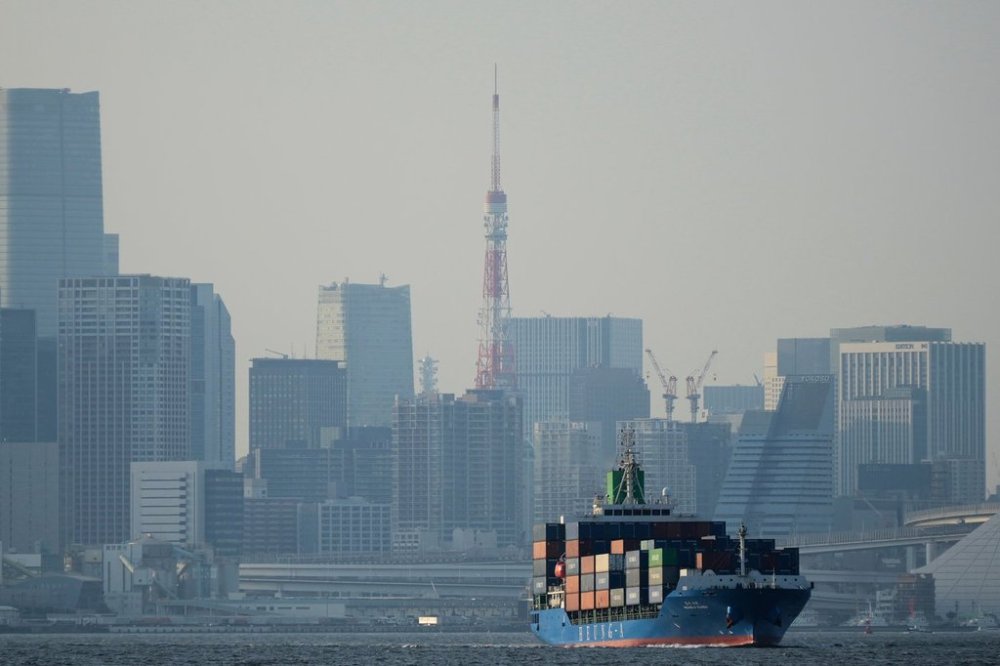Japan’s exports and imports grow in September despite Trump’s tariffs
Advertisement
Read this article for free:
or
Already have an account? Log in here »
To continue reading, please subscribe:
Monthly Digital Subscription
$1 per week for 24 weeks*
- Enjoy unlimited reading on winnipegfreepress.com
- Read the E-Edition, our digital replica newspaper
- Access News Break, our award-winning app
- Play interactive puzzles
*Billed as $4.00 plus GST every four weeks. After 24 weeks, price increases to the regular rate of $19.00 plus GST every four weeks. Offer available to new and qualified returning subscribers only. Cancel any time.
Monthly Digital Subscription
$4.75/week*
- Enjoy unlimited reading on winnipegfreepress.com
- Read the E-Edition, our digital replica newspaper
- Access News Break, our award-winning app
- Play interactive puzzles
*Billed as $19 plus GST every four weeks. Cancel any time.
To continue reading, please subscribe:
Add Free Press access to your Brandon Sun subscription for only an additional
$1 for the first 4 weeks*
*Your next subscription payment will increase by $1.00 and you will be charged $16.99 plus GST for four weeks. After four weeks, your payment will increase to $23.99 plus GST every four weeks.
Read unlimited articles for free today:
or
Already have an account? Log in here »
TOKYO (AP) — Japan’s exports grew 4.2% in September, according to government data Wednesday, on robust shipments to Asia that offset a decline in exports to the U.S., which were impacted by President Donald Trump’s tariffs.
Japan’s exports to Asia jumped 9.2% last month compared to the same period a year earlier, according to Japanese Ministry of Finance data.
Exports to the U.S. dropped 13.3%, marking the sixth straight month of on-year declines, while those to China surged 5.8% compared to last year.

Auto shipments to the U.S. dropped 24.2% in September. Automakers like Toyota Motor Corp. are pillars of Japan’s economy.
Japan’s imports edged up 3.3% in September overall, growing 6% in Asia, including a 9.8% rise in imports from China.
The findings come a day after Sanae Takaichi was chosen in a parliamentary vote as the nation’s prime minister, becoming the first woman to lead Japan.
She is known for nationalist-leaning conservative views but is also seen as a proponent of bigger public spending, which has sent share prices generally rising in Tokyo in recent sessions.
Takaichi has also promised higher wages, as well as looser monetary policy, which would favor a weak Japanese yen. That would be a boon for the nation’s giant exporters by raising the value of overseas earnings when converted into yen.
Takaichi faces an uphill battle in realizing her policies because the ruling Liberal Democratic Party, even with coalition partners, does not have a majority in either house of parliament. Her own party remains divided.
Trump, who is expected to visit Japan later this month to meet with Takaichi, announced a trade framework with Japan in July that placed a 15% tax on Japanese goods.
At that time, Japan promised to invest $550 billion into the U.S. and open its economy more to American automobiles and rice. The 15% tax on imported Japanese goods was a significant drop from the 25% rate that Trump had said earlier.
___
Yuri Kageyama is on Threads: https://www.threads.com/@yurikageyama

